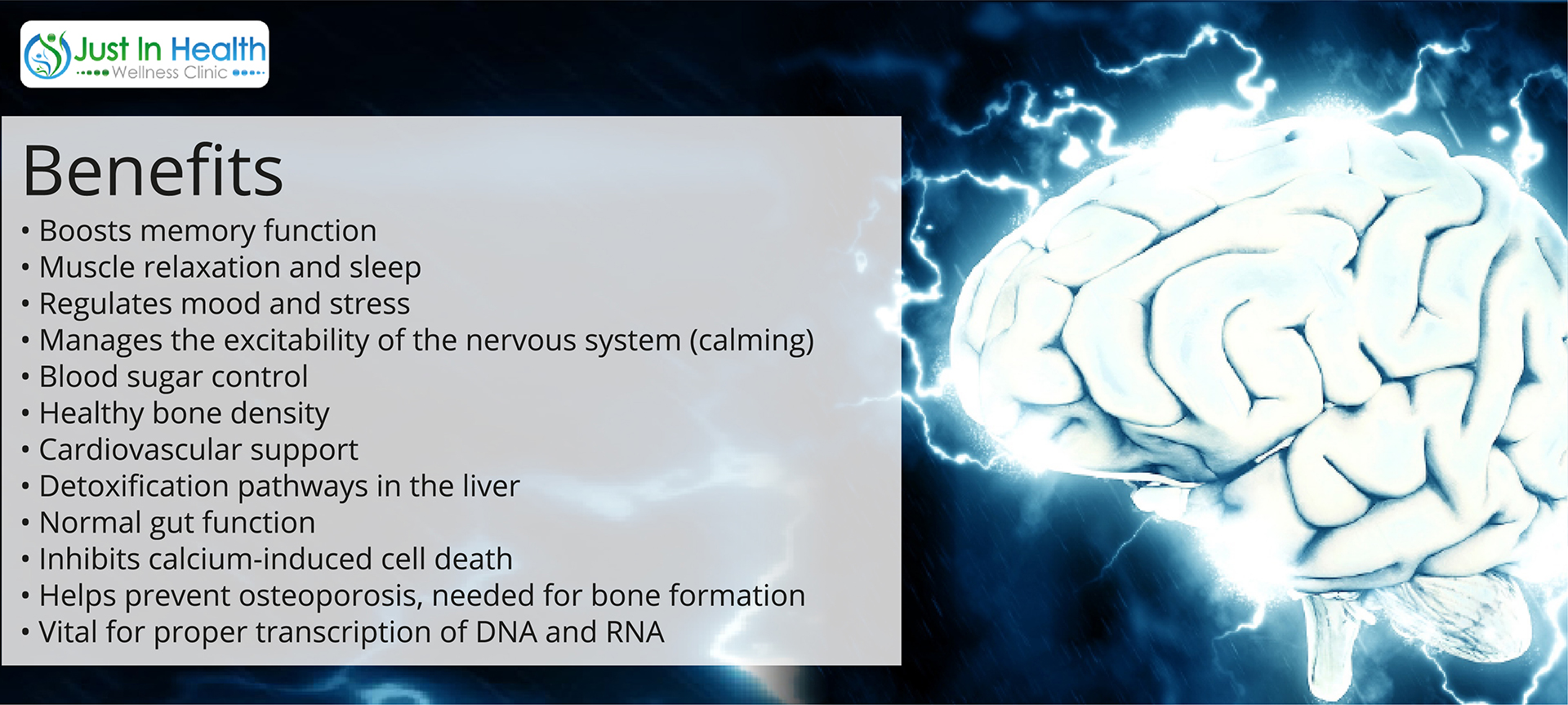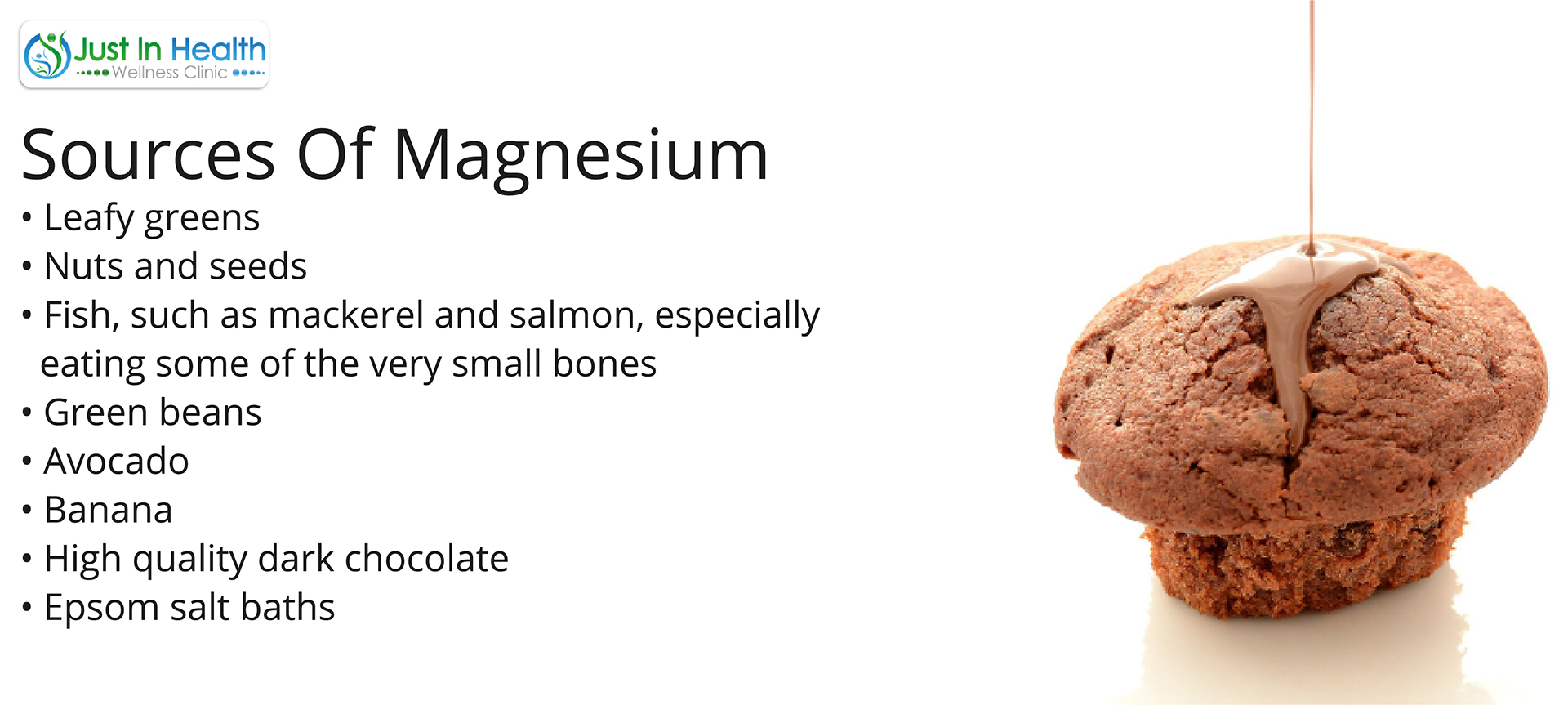Magnesium Deficiency Causes and Solutions

By: Dr. Justin Marchegiani
Magnesium is essential for proper function of over 300 enzymatic reactions and for the performance of many vital physiological functions: from heartbeat regulation to muscle contraction and relaxation. Magnesium is crucial to the body and plays a part in almost every facet of your well-being and that is why a magnesium deficiency can be responsible for almost every symptom dragging you down.
BENEFITS

- Boosts memory function
- Muscle relaxation and sleep
- Regulates mood and stress
- Manages the excitability of the nervous system (calming)
- Blood sugar control
- Healthy bone density
- Cardiovascular support
- Detoxification pathways in the liver
- Normal gut function
- Inhibits calcium-induced cell death
- Helps prevent osteoporosis, needed for bone formation
- Vital for proper transcription of DNA and RNA
A study on magnesium for insomnia in the elderly found that supplementation of magnesium improves insomnia through several measures, including sleep efficiency, sleep time, and concentration of melatonin.
DEFICIENCY CAUSES AND SYMPTOMS

Due to soil depletion and the omnipresence of processed foods, magnesium is becoming hard to find in the average American’s diet. Even within the health-conscious, high rates of prescription medications and antibiotic use lead to digestive disorders and impaired gut function, causing malabsorption of not only magnesium, but of minerals and nutrients in general, despite an otherwise clean diet.
Watching sugar and caffeine intake is important to ensure proper absorption of magnesium. Fluoride in our water supply can also negatively affect magnesium absorption.
A magnesium deficiency can cause:
- Muscles aches and spasms
- Poor digestion
- Anxiety
- Trouble sleeping and insomnia
- Kidney and liver damage
- Hypertension
- Cardiovascular disease
- Multiple Sclerosis
- Alzheimer’s
- Worsened PMS
- Behavioral disorders
- Mood swings
- Osteoporosis
- Depressed immune system
- Cavities
- Muscle weakness and cramps
- Heart arrhythmias
- Headaches
- Nausea
- Depression
…and pretty much everything else you don’t want. Neurosurgeon Dr. Norman Shealy says ,“Every known illness is associated with a magnesium deficiency […] A magnesium deficiency may be responsible for more diseases than any other nutrient.”
A study by the British Journal of Cancer in December 2015 looked at the incidents of pancreatic cancer by magnesium intake categories of 66,000 men and women, aged 50-76. It found that for every 100mg per day of magnesium less that was consumed, your risk for pancreatic cancer went up by 24%.
If you are concerned about a magnesium deficiency or have other health queries, book your intro consult today with Dr. Justin: http://justinhealth.com/free-consultation/
SOURCES OF MAGNESIUM

- Leafy greens
- Nuts and seeds
- Fish, such as mackerel and salmon, especially eating some of the very small bones
- Green beans
- Avocado
- Banana
- High quality dark chocolate (It’s postulated that women crave dark chocolate around the start of their period because the magnesium helps with cramps and PMS symptoms)
- Epsom salt baths are excellent as you have a large surface area (your skin) taking in the magnesium. Try 1-2 cups of Epsom salt (which is basically magnesium sulfate) in your bath for some incredibly relaxing effects.
- An alternate mode of relaxation through magnesium would be to hop into a float tank. Taking in about a thousand pounds of Epsom salt in about 10 inches of water leaves you feeling incredible.
- An alternate mode of relaxation through magnesium would be to hop into a float tank. Taking in about a thousand pounds of Epsom salt in about 10 inches of water leaves you feeling incredible.
DOSAGE & FORMS
- Magnesium oxide only has about a 4% absorption rate and is comparable to table chalk. It’s cheap, easy to find, and works well as a laxative.
- Magnesium citrate, as you find in such products as Natural Calm, is a step above magnesium oxide. It’s also rather inexpensive, works as a laxative, with a higher absorption rate.
- Magnesium malate is very well-absorbed and acts as a calming agent rather than a laxative.
- Magnesium glycinate is also calming without the laxative effect. It is well-absorbed as it binds to the amino acid glycine. The glycinate form tends to provide the highest levels of absorption and bioavailability, and therefore is ideal for those trying to correct a deficiency.
- Magnesium threonate is a newer form which seems promising due to its ability to cross the blood-brain barrier and mitochondrial membrane.
If you are looking to get some extra magnesium into your diet, try Magnesium Supreme (https://justinhealth.com/products/magnesium-supreme/): a relaxing 50/50 blend of Magnesium malate and Magnesium glycinate.
To listen to Dr. Justin’s podcast with Evan Brand on magnesium, check out podcast #93: https://www.youtube.com/watch?v=9LWIGamxE2k
References:
https://www.ncbi.nlm.nih.gov/pmc/articles/PMC4455825/
https://www.ncbi.nlm.nih.gov/pubmed/10727669
https://www.ncbi.nlm.nih.gov/pmc/articles/PMC1855626/
https://www.ncbi.nlm.nih.gov/pubmed/23853635
https://www.ncbi.nlm.nih.gov/pubmed/19828898
http://gotmag.org/magnesium-deficiency-101/
http://articles.mercola.com/sites/articles/archive/2013/12/08/magnesium-health-benefits.aspx
https://www.youtube.com/watch?v=RVZqJM5BGRU




